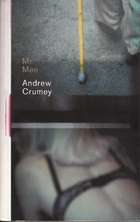Mr Mee by Andrew Crumey
Posted in Read Scotland 2014, Reading Reviewed, Scottish Fiction, Allan Massie, Andrew Crumey at 15:00 on 2 February 2014
Picador, 2000, 344 p.

Mr Mee bears several Crumey hallmarks; explanations of concepts from Physics (and, in this case, probability) in literary form, characters from the 18th century, ruminations on literature and philosophy. The narrative is triple stranded: that of Mr Mee himself, in the form of the eighty six year old’s letters to an old friend; the adventures of two Frenchmen, “the Gossips,” Ferrand and Minard, who meet Jean-Jacques Rousseau and precipitate his flight from France; and the meanderings of academic Dr Petrie whose main research interest is those same two Frenchmen. The epilogue introduces a fourth narrator who once installed a Théâtrophone in the bedridden Marcel Proust’s apartment. It casts further light on the preceding stories and has the potential to alter the reader’s perceptions of them, though is perhaps a little too eager to drop in literary allusions.
The unworldly Mr Mee, stuck in his ways and almost drowning in a sea of books, is prompted by his housekeeper, Mrs B, to discover that the worlds of literature and philosophy are available through the less space consuming medium of the PC and the internet. What he finds there intrigues him – and shocks Mrs B into leaving abruptly. His old fashioned attitudes to modern life and his misunderstandings are a source of light humour (“those nice folk at Dixons,” the joys of live video links – a bus stop in Aberdeen and a naked girl reading a book which is of course Dr Petrie’s on Ferrand and Minard, the “sensational and sentimental” fare that passes for Scottish literature in a modern bookshop) unusual in Crumey’s work. His encounter with practical and capable life scientist student Catriona leads the unmarried (and sexual ingénu) Mr Mee to new experiences.
Ferrand and Minard are copyists, whose latest project regarding a new understanding of how the world works is stolen from their flat and whose downstairs neighbour has been murdered. Fearing the blame for the killing they flee to Montmorency, come under the protection of a Bishop Bertier and end up living next door to Rousseau who is said to think the world would be a much better place without books.
Dr Petrie has been captivated by the sexual possibilities involved in his tutoring of a mature (twenty four year old) student called Louisa and imagines his disease symptoms are a reflection of his attraction to her. He believes Ferrand and Minard to have been invented by Rousseau whose Confessions he says are as much a fiction as was the novel Émile.
The text contains a lot of literary reference; not just to Rousseau and Proust but to mechanical poetry and the pitfalls of attributing what happens in a novel to autobiography, (“a person called ‘I’ who is not necessarily oneself.”) Other aperçus include, “the moment in which we live, like the self we inhabit, is the one we are least equipped to understand,” “when faced with an unfamiliar situation, we play the part as best we can; and our scripts come to us from many places,” the contention that “all men write for sex,” and the observation that “out of character” simply means unexpectedly. (Compare Allan Massie.)
Mr Mee is a kind of companion piece to D’Alembert’s Principle; some of that books preoccupations reappear – we hear again of D’Alembert and Diderot and their Encyclopédie – and there is a sly reference to the contents of Crumey’s earlier book Pƒitz. Dr Petrie tells Louisa that “Rousseau’s novel, like Proust’s, is intimately concerned with the nature of writing.” So, too, is Crumey’s, an engagement with what a novel is, or can be, the uses to which fiction can be put and an examination of the ways in which texts can be interpreted. While the book can be read solely for the stories contained within it these other aspects for me add value, elevate it beyond the level of just a novel but, curiously in such a well-crafted literary piece of work, we twice had “chord” for “cord,” even if I was also grateful to be introduced to the useful word “anacoluthon” (lack of syntactical agreement of the latter part of a sentence with the former.)
I had some misgivings about the way Mr Mee’s relationship with Catriona develops. She is depicted as being in control throughout (indeed she is by far the more knowing of the two, about modern life as well as in a sexual sense) but still. However, yet again Crumey has written an intriguing novel, well worth anyone’s attention.
Tags: Diderot, Dixons, Ferrand and Minard, Jean-Jacques Rousseau, Marcel Proust, Montmorency, Allan Massie, Pƒitz, anacoluthon, Physics, Andrew Crumey, Bishop Bertier, D'Alambert's Principle
